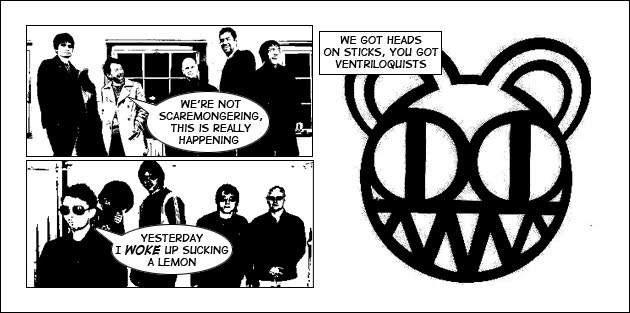(t5!) Heroes Of The Zeroes Albums: #01: Radiohead – Kid A (2000)
So here we are, the end of the line, the cream of the crop, the most kick-ass album out of all the kick-ass albums that came out from the zeroes. I kind of don’t feel like talking about this one though. It’s not fun anymore. Perhaps this is the greatest testament to Radiohead’s excellence and prestige. No other band and album (maybe since The Beatles) have been debated over by “serious” music listeners. It has been argued about for so long that bringing it up in a conversation now between people with musical opinions elicits a shudder. This band’s illustriousness have become ridiculously close to just being assumed at this point. But, I gotta talk about it. Even if you’re not surprised, even if you don’t want to hear it, there’s not even a question that Radiohead’s Kid A is the (t5!) best album of the zeroes.
The chances are you already know what’s up with Kid A, but let’s recap anyway. Three years after OK Computer was released, the post-alternative-progressive-rock classic that propelled them in the tier with the best bands of forever, Radiohead abstained from their flair for the guitars that defined them before in favor of drum machines, ambient synth soundscapes, and knob tweaking. The strategy should’ve been a commercial catastrophe, especially since the band eschewed from more things like music videos and traditional promotional tactics. However, thanks to the band’s unceasingly increasing commercial and critical reputation, as well as an unofficially authorized leak of the album online (which also made Kid A vanguards in that arena) the hype behind the album was pushed to immeasurable proportions. Of course, it polarized Radiohead’s listeners—the old-school fans were blindsided by the lack of rock—but just about everyone eventually seemed to come around to Kid A, recognizing it as the venturesome and beautiful masterpiece that it was, according it as the consensus Album of the Decade even when it was released in the first year of the zeroes.
Obviously, all of the tracks in Kid A are stellar: the delicate title track, the phantasmagorical “Everything In Its Right Place”, the haunting “How To Disappear Completely”, the muscular “The National Anthem”, the driven “Optimistic”, the bewitching “Motion Picture Soundtrack”, the skittering “Idioteque”. However, it seems unavailing to talk about the individual songs in the album because it’s one of the last albums that attest to the “the whole is greater than the sum of its parts” adage. Mp3’s and iTunes ushered in an era where it becomes uncommon for albums to feel like much more than just an assemblage of tracks. And it’s not that albums of the zeroes in general have changed to a certain degree, maybe it’s just the way we listen to them have changed: picking and choosing our favorite tracks like they belong in a smorgasbord, putting our archives in shuffle, stuff like that. Sure, we get a Girl Talk album once in a while where it’s fun to see how the tracks are mashed up, or a Godspeed You Black Emperor! album once in a while where you get four 25-minute songs that defeat the definition of a “track”; however, it’s unlikely we’ll get too many albums like this again, where the flow and structure feel absolutely critical to the maximization of each of the song’s potential. It’s such a worn out cliché, but it’s one that rings true here nonetheless.
One of the more boring debates that spawned when Kid A was released was whether or not the album was rightfully innovative. People would draw attention to how much it borrowed from art-rock idols like Brian Eno and Can, 90’s IDM groundbreakers like Aphex Twin and Autechre, and OG prog-rockers like King Crimson and Pink Floyd. But I say this: what’s wrong with that? We can listen to an Interpol album that sounds like Joy Division or The Rapture album that sounds like Gang Of Four, but a Radiohead album that may not be entirely avant-garde is unlistenable? As long as it’s enjoyable, am I correct? Having said that, It did portend to the laptop pop crusade that would bubble from the electronic underground for much of the zeroes. So suck that, naysayers.
To some extent, Kid A introduced a generation of music listeners—aspiring indie kids, stoners who are looking to bind their drugs to a specific music, and other fans, like myself, who are seeking for musical epiphanies—to a whole new sphere of possibility in music. Even those fans that aren’t particularly looking for anything new and unusual were given something uncanny and unfamiliar and cool to rally behind, and that’s something worth celebrating. Radiohead never made an artistic leap quite so extreme again for the rest of the zeroes, but they satiated their fans with a series of terrific albums.
But let’s not spend the next decade talking about it, shall we not? Just go listen to the album or something. You’ll see that “it’s like witnessing a stillborn birth of a child while simultaneously having the opportunity to see her play in the afterlife on Imax.” Seriously.



Comments